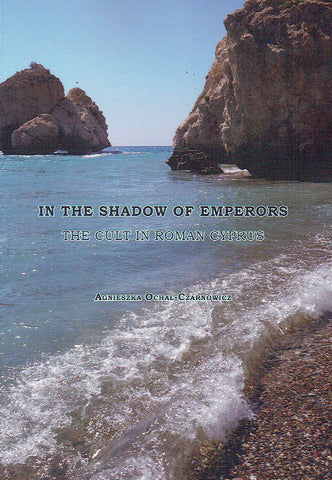In the Shadow of Emperors, The Cult in Roman Cyprus
18,00 $
ISBN: 978-83-64449-72-7
Description: softcover, 92 pages (25x18cm), figs., plates
Condition: new
Weight: 270g.
Agnieszka Ochal-Czarnowicz, In the Shadow of Emperors, The Cult in Roman Cyprus, Alter, Krakow 2018
As Jody Michael Gordon underlines in his PhD thesis Between Alexandria and Rome: A Postcolonial Archaeology of Cultural Identity in Hellenistic and Roman Cyprus (2012), the history of Cyprus has long been viewed as a linear succession of imperial powers. From this viewpoint, cultural change under imperial rule was understood as a natural process of the conquered passively accepting the empire’s superior culture. When imperial culture was in some respect not fully accepted by the local community, this was often interpreted as an act of resistance. In recent years, however, methodical and epistemological development in classical archaeology has called into question the existing interpretations of cultural changes during the Hellenistic and the Roman period. New perspectives in humanities discourse, the postcolonial theory in particular, have caused scholars to re-evaluate traditional assumptions. The emphasis falls on the complexity of cross-cultural interaction between the colonizing and colonized groups. Epistemological changes have also occurred in Cypriot archaeology. Detailed GIS analysis of old archaeological data as well as new excavation works including those in Amathous, Idalion, Nea Paphos and in the rural sites such as Athienou-Malloura, Panayia Ematousa have led to new interpretations of how Cypriot culture changed under Roman rule. Instead of a one-way Romanization process, both local Cypriot and foreign archaeologist have begun to perceive the impact of the Roman culture as a developing, pluralistic dialogue of different trends reflecting the island’s multicultural past. The cult of heroes in Roman Cyprus project financed by the Polish National Science Center awarded on the basis of decision number DEC-2012/07 /N /HS3 /00858 has made a small contribution to the broader vivid academic discourse on Roman Cyprus. The research focused on the religious landscape in general and the worship of heroes in particular. The worship of heroes is one of the most fascinating aspects of the Greek religion. Heroes were the essence of the society from which they came. According to G. Heedren (1991), the main difference between the worship of heroes and Olympic gods lies in the geographical limits of the cult. While a hero-cult was most often restricted to a particular locality, the worship of the Olympian gods was usually widespread. Hence, tracing the heroes’ cult gives a good insight into the local religious tradition, which is very important within the discourse about the complexity of the Romanization process. In the culture of any society, there are values which form the basis of its identity and nothing reflects them better than the religious sphere.
Description: softcover, 92 pages (25x18cm), figs., plates
Condition: new
Weight: 270g.
Agnieszka Ochal-Czarnowicz, In the Shadow of Emperors, The Cult in Roman Cyprus, Alter, Krakow 2018
As Jody Michael Gordon underlines in his PhD thesis Between Alexandria and Rome: A Postcolonial Archaeology of Cultural Identity in Hellenistic and Roman Cyprus (2012), the history of Cyprus has long been viewed as a linear succession of imperial powers. From this viewpoint, cultural change under imperial rule was understood as a natural process of the conquered passively accepting the empire’s superior culture. When imperial culture was in some respect not fully accepted by the local community, this was often interpreted as an act of resistance. In recent years, however, methodical and epistemological development in classical archaeology has called into question the existing interpretations of cultural changes during the Hellenistic and the Roman period. New perspectives in humanities discourse, the postcolonial theory in particular, have caused scholars to re-evaluate traditional assumptions. The emphasis falls on the complexity of cross-cultural interaction between the colonizing and colonized groups. Epistemological changes have also occurred in Cypriot archaeology. Detailed GIS analysis of old archaeological data as well as new excavation works including those in Amathous, Idalion, Nea Paphos and in the rural sites such as Athienou-Malloura, Panayia Ematousa have led to new interpretations of how Cypriot culture changed under Roman rule. Instead of a one-way Romanization process, both local Cypriot and foreign archaeologist have begun to perceive the impact of the Roman culture as a developing, pluralistic dialogue of different trends reflecting the island’s multicultural past. The cult of heroes in Roman Cyprus project financed by the Polish National Science Center awarded on the basis of decision number DEC-2012/07 /N /HS3 /00858 has made a small contribution to the broader vivid academic discourse on Roman Cyprus. The research focused on the religious landscape in general and the worship of heroes in particular. The worship of heroes is one of the most fascinating aspects of the Greek religion. Heroes were the essence of the society from which they came. According to G. Heedren (1991), the main difference between the worship of heroes and Olympic gods lies in the geographical limits of the cult. While a hero-cult was most often restricted to a particular locality, the worship of the Olympian gods was usually widespread. Hence, tracing the heroes’ cult gives a good insight into the local religious tradition, which is very important within the discourse about the complexity of the Romanization process. In the culture of any society, there are values which form the basis of its identity and nothing reflects them better than the religious sphere.

